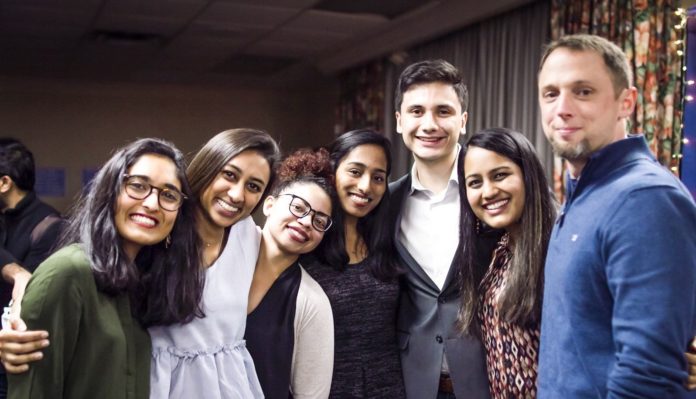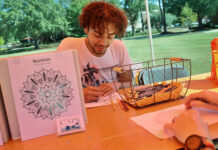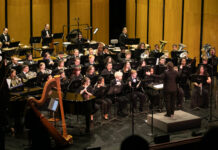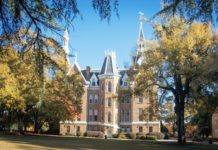
College is a time of independence and discovery … and sometimes struggles. A Mercer program launched in fall 2017 is showing students they’re not alone and connecting them with resources to tackle their problems.
Real Talk is a monthly speaker series started by Research That Reaches Out (RTRO) and the Office for Student Success, with the latter set to fully take over the program this fall. Faculty or staff members, recommended through student surveys and focus groups, tell personal stories about their lives and the trials they faced during college.
Once a semester, five or six students also share their experiences during Real Talk: Student Edition. The next Student Edition is April 11 at 8 p.m. in Connell Student Center Conference Room I on Mercer’s Macon campus.
“The idea with Real Talk is we know that everybody goes through challenges, that everybody has experiences that help them to grow,” said Emily Halstead, assistant director of student success for the Office of Student Success. “We can learn from one another if we bring our experiences to light.”
Students often think they’re the only ones going through what they’re dealing with. The reality is that many people are facing similar challenges, but they’re not talking about them and only letting others see what they want them to see. Real Talk aims to break down that wall and facilitate conversation so students won’t feel alone.
Another goal is to help students feel more connected and comfortable with faculty. Professors faced their own hurdles while going through college, and students can learn from them and their experiences. It can be really powerful for students to hear that a faculty member who grades their tests also failed a test or two when they were in college, Halstead said.
“We want students to understand that faculty members are human, too, and to make them more relatable and approachable,” Halstead said.
Chemistry professor Dr. Garland Crawford, the very first Real Talk speaker, detailed his time as a Mercer student, his career path after Mercer and his experiences in the military. Africana studies professor Dr. Chester Fontenot Jr. spoke about being a first-generation college student, and history professor Dr. Doug Thompson talked to students about trying to figure out his life path.

On March 19, Mercer Innovation Center (MIC) director Stephanie Howard talked to some 20 students at the MIC. She is the first repeat speaker for the Real Talk series. During her hour-long presentation, she shared personal details of her high school and college days and asked the students questions about their lives. She spoke about learning to stand on her own, being true to herself, evolving as a person, letting experiences shape her and how relationships affect personal growth.
“We hear a lot of students say that (the program) made them feel less alone, that they didn’t realize other people were going through the same thing and that it gave them confidence in their ability to navigate challenges, feel comfortable talking with others and reach out for help,” Halstead said.
Instructors for the UNV 101 course sometimes advertise the Real Talk events to their first-year students and give them credit for attending.
Sophomores Shailey Shah and Robyn Guru came up with the idea for Real Talk: Student Edition and co-organize all those events with Halstead and Hannah Vann, associate director of RTRO. After an application and interview process, they choose five or six students to deliver five-minute talks. The speakers attend a writing workshop and are coached for three weeks so they are confident and well-prepared for the event.
“Students can relate to other students more than anyone,” said Guru, a biomedical engineering major. “We thought that college students could take a lot away from hearing other students talk about their struggles.”
Past student speakers have shared stories about bicultural identity, mental and physical health challenges, and being a first-generation college student, Halstead said. In one way or another, they all talk about finding themselves and discovering ways to be resilient, Shah and Guru said.
The talks are meant to be conversational, not lectures. It’s a learning experience that’s mutually beneficial for the speakers, who find more clarity in their situation after telling their stories, as well as the audience members, who realize they are not alone and make connections with people facing similar challenges.
“Don’t be afraid of who you are – that’s the takeaway message for all these things,” Shah said. “What you have to say and what you think, all of it matters. I hope that this outlet can help some people find that their words are meaningful to other people.”
Students learn they are responsible for their own success, but that doesn’t mean doing everything on their own. A big part of Real Talk is encouraging them to use campus resources when they need them, and helpful information is listed on the back of the Student Edition programs, Halstead said.
Real Talk events featuring faculty speakers are held at the MIC and have drawn up to 50 audience members. The Student Edition programs call for a larger venue, the Connell Student Center, since as many as 100 people have attended in the past.
Shah and Guru said they plan to create a series of podcasts, with audio of the events as well as behind-the-scenes interviews, so Real Talk will be available to people who can’t attend in person.
Real Talk: Student Edition is April 11 at 8 p.m. in Connell Student Center Conference Room I on Mercer’s Macon campus. For more information on Real Talk, visit studentsuccess.mercer.edu.








